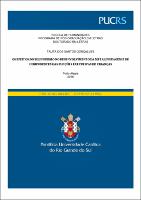| Compartilhe o registro |


|
Use este identificador para citar ou linkar para este item:
https://tede2.pucrs.br/tede2/handle/tede/7874| Tipo do documento: | Tese |
| Título: | Os efeitos do bilinguismo no desenvolvimento da metalinguagem e de componentes das funções executivas de crianças |
| Autor: | Gonçalves, Talita dos Santos  |
| Primeiro orientador: | Hübner, Lilian Cristine |
| Primeiro coorientador: | Fonseca, Rochele Paz |
| Resumo: | A partir de uma perspectiva psicolinguística, este estudo transversal se insere em uma interface entre bilinguismo infantil e cognição. O objetivo principal deste estudo é investigar se há diferenças em escolares bilíngues (falantes de português brasileiro e espanhol) e monolíngues (falantes de português brasileiro) quanto a componentes das funções executivas e à metalinguagem. A fim de testar a hipótese de que o bilinguismo impacta no desenvolvimento dos componentes das funções executivas e da metalinguagem, 23 crianças bilíngues e 23 monolíngues (n=46), distribuídas igualmente conforme idade e ano escolar (do 1º ao 3º ano do Ensino Fundamental), foram examinadas por meio de tarefas verbais e não verbais de funções executivas e de tarefas de metalinguagem. As tarefas verbais que avaliam componentes das funções executivas foram Teste Hayling Infantil, subtestes Span de Pseudopalavras e de dígitos. Já as tarefas não verbais foram Teste dos Cinco Dígitos, Teste de Cancelamento de Sinos, Teste Blocos de Corsi e o Teste de Trilhas Infantil. As tarefas de Arbitrariedade da Língua e Substituição de Símbolos foram aplicadas para avaliar a metalinguagem. Dentre as nove tarefas propostas, derivaram-se 42 medidas, entre as quais 18 apresentaram diferenças estatisticamente significativas (14 apontam vantagem bilíngue e quatro vantagem monolíngue). Por meio do teste estatístico Mann Whitney, observou-se que não houve diferenças na comparação entre grupos quanto às medidas de metalinguagem. De modo geral, em relação às medidas que avaliam os componentes das funções executivas, o grupo bilíngue superou o grupo monolíngue na maioria das diferenças encontradas. Constatou-se que há diferenças entre bilíngues e monolíngues quanto ao timing para adaptação a mudanças (flexibilidade cognitiva). |
| Abstract: | From a psycholinguistic perspective, this cross-sectional study falls on an interface between child bilingualism and cognition. The main objective of this study is to verify whether there are differences in bilingual (Brazilian Portuguese and Spanish speakers) and monolingual students (Brazilian Portuguese speakers) as the components of executive functions and meta-language. In order to test the hypothesis that bilingualism impacts in the development of ex-ecutive functions components and metalanguage, twenty-three (23) bilingual and 23 monolin-gual children, forty-six (n = 46), equally distributed according to age and school year - from first (1st) to third (3rd) year of elementary school), were examined through verbal and non-verbal tasks of executive functions and tasks of metalanguage. Verbal tasks that assess com-ponents of executive functions were Child Hayling Test, the subtests of Children´s Test of Pseudowords and Children Digit Span Test. Non-verbal tasks were Five Digit Test, Bells Test, Corsi Block Test and Trail Making Test for Children. Language Arbitrariness Test and Symbol Substitution Test were applied to evaluate the metalanguage. Forty-two (42) measures were derived from the nine proposed tasks, among which eighteen (18) have presented statis-tically significant differences, fourteen (14) have showed bilingual and four (4) monolingual advantage. Through the Mann Whitney statistical test, it was observed that there were no dif-ferences in the comparison between groups as the metalanguage measures. In general, consid-ering the measures that evaluate the components of the executive functions, the bilingual group has overcome the monolingual group in most of the found differences. It was found that there are differences between bilinguals and monolinguals regarding timing for adaptation to changes (cognitive flexibility). |
| Palavras-chave: | Bilinguismo Infantil Funções Executivas Inibição Memória de Trabalho Flexibilidade Cognitiva Metalinguagem Vantagem Bilíngue |
| Área(s) do CNPq: | LINGUISTICA, LETRAS E ARTES::LETRAS |
| Idioma: | por |
| País: | Brasil |
| Instituição: | Pontifícia Universidade Católica do Rio Grande do Sul |
| Sigla da instituição: | PUCRS |
| Departamento: | Escola de Humanidades |
| Programa: | Programa de Pós-Graduação em Letras |
| Tipo de acesso: | Acesso Aberto |
| Restrição de acesso: | Trabalho será publicado como artigo ou livro |
| Prazo para liberar texto completo: | 60 meses |
| Data para liberar texto completo: | 08/03/2023 |
| URI: | http://tede2.pucrs.br/tede2/handle/tede/7874 |
| Data de defesa: | 11-Jan-2018 |
| Aparece nas coleções: | Programa de Pós-Graduação em Letras |
Arquivos associados a este item:
| Arquivo | Descrição | Tamanho | Formato | |
|---|---|---|---|---|
| TES_TALITA_DOS_SANTOS_GONCALVES_COMPLETO.pdf | TALITA_DOS_SANTOS_GONCALVES_TES | 2,13 MB | Adobe PDF |  Baixar/Abrir Pré-Visualizar |
Os itens no repositório estão protegidos por copyright, com todos os direitos reservados, salvo quando é indicado o contrário.




